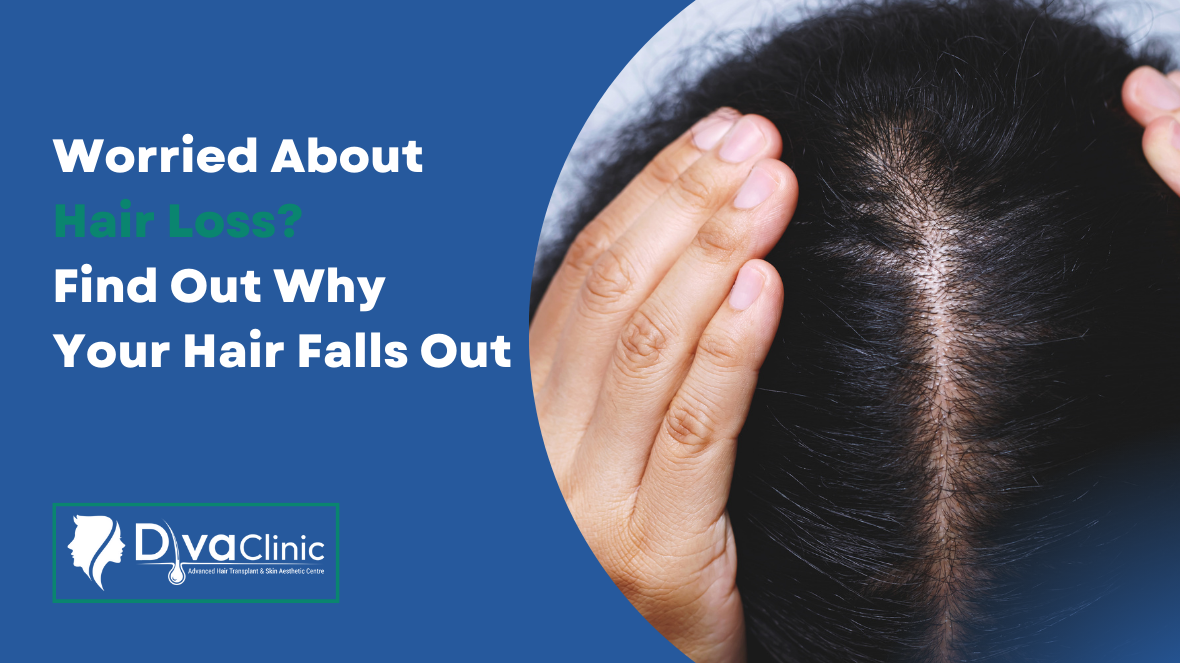

E-Brochure - Download Now!


Experiencing excessive hair loss can be traumatic. While shedding 50-100 hair strands daily is normal, if you notice an increasing amount of hair in your hairbrush, clothing, or bathroom drain, it may be a cause for concern. If you have mild thinning or bald patches, identifying the reason for your hair loss is crucial to finding the right solution to your hair woes.
“Why is my hair falling out?” If this question has been troubling you lately, this blog will help you find the answer by discussing the potential causes of hair loss. Knowing what’s causing your hair to fall out can be the first significant step in your journey toward a fuller and thicker head of hair.
The list below includes the most common causes of hair loss. The causes are:
Also known as male or female pattern baldness, androgenetic alopecia is a genetic condition that is one of the most common causes of hair loss. While men with androgenetic alopecia are prone to losing hair from the temples and the crown of the head, resulting in receding hairlines and bald spots, hair thinning occurs all along the crown of the head for women.
Another common cause of hair issues is seborrheic dermatitis of the scalp, commonly known as dandruff. This condition may present as white flakes, itching, burning sensations, or scalp rashes. Dandruff tends to be more prevalent during winter and monsoon seasons.
If you are on medication with hair loss as a side effect, you may lose hair faster than usual. The hair loss-causing medicines may include:
Hormonal imbalance caused by declining oestrogen levels can be a significant cause of hair loss for women after pregnancy and menopause. You may be in for a shock when the glossy and luscious hair you had during your pregnancy starts falling out at an alarming rate after childbirth. However, it is a temporary condition that usually resolves independently in a few months.
Women undergoing menopause also experience thinning hair. This may be due to:
Your excessive hair loss may be due to a health condition such as:
If you have had bariatric or weight loss surgery, hair loss can be one of its side effects in the following months as you recover due to reduced zinc levels in the body.
Inadequate intake of certain vital nutrients may impact hair growth and can be a reason for hair loss. Your diet must include:
Stress can adversely affect your hair growth cycle, resulting in telogen effluvium, a prolonged telogen phase that includes thinning hair around the crown of the head.
Unchecked stress levels may have more severe consequences, which include conditions such as alopecia areata, an autoimmune disease, and trichotillomania, a hair-pulling disorder.
Frequent usage of harsh shampoos and conditioners, combing hair when wet, and forcibly rubbing or brushing hair may lead to breakages and hair loss.
Long-term tight hairstyles can cause traction alopecia, a condition wherein you may develop thinning hair or patches of hair loss.
Excessive use of hair styling tools and products, including blow dryers, flat and curling irons, bleach, dye, relaxers, and sprays, can damage and weaken hair, leading to hair loss.
While worrying about hair loss is normal, you can take practical steps to address your unique hair loss issue by finding its reasons. Hair loss’s causes vary and may range from genetic and other health-related problems, medications, and diet to stress and how well you care for your hair.
Lucknow-based Diva Clinic is one of the city’s premier hair loss clinics. Our team of hair restoration experts, led by renowned hair transplant specialist Dr. Vivek Kumar Saxena, offers the most advanced hair restoration technologies for a wide range of services, including hair transplants, hair loss treatments, PRP, and Low-Level Laser Therapy (LLLT).
If you are looking for the best hair clinic near you in Lucknow, with over 16 years of experience, during which we have performed over 8000 hair transplants with outstanding results, we can be your best option.
To book an appointment, contact us!